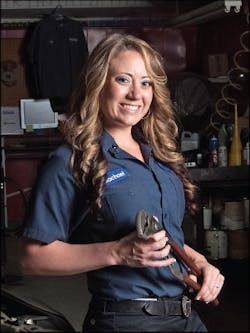Rachael Lewis is not your typical shop operator. The 27-year-old former esthetician didn’t start out as a technician. Her father ran a shop, but she never worked in it. Until recently, vehicle maintenance and repair was unfamiliar territory—just as foreign to her as business management.
Given her background, you’d never guess she’s the one who orchestrated the remarkable turnaround of City Auto Repair, her father’s shop in Gainesville, Fla., taking it from $475,000 in revenue in 2011 to $800,000 in 2012. Her fresh perspective, new ideas, eagerness to learn and ability to relate to customers all helped her get there. Now she’s poised to take over the family business and plans to grow it even further, with the goal of opening a second location within the next five years.
Though a common concern in the automotive repair industry is a looming shortage of qualified professionals to carry the industry forward, Lewis is proof that the next generation of shop operators is here and more than capable of achieving great success.
“I firmly believe there are more young people ready to go to work and do a good job than you would ever believe,” says industry consultant Gary Gunn, owner of Turnaround Tour, who has worked with Lewis. “We just have to start fishing
for them.”
Lewis and one other up-and-coming operator, 29-year-old Richard Weis of J & R Services in Crossville, Tenn., share how they got involved in automotive repair and their strategies for growth in today’s changing industry.
Passion for Repair
Fred Lewis, Rachael’s father, was looking to get out of the business he started 32 years ago when Rachael first showed an interest in getting involved two years ago. Fred, who led the business to revenues as high as $1 million in previous years, says he was burnt out, the shop was stuck in a rut, employees were on “cruise control,” and sales were steadily declining.
Rachael had recently had a son and after four years as an esthetician and a brief stint in the insurance industry, she wanted a more stable career. After a talk with her dad, she thought there might be an opportunity to revive the shop.
“We were sitting and talking about it and I was very unhappy in what I was doing,” Rachael says. “And he said, ‘Well, what do you think about coming in and seeing if it would be something you would be interested in?’”
Rachael started out sweeping floors and driving customers, and gradually came to the realization that she was the embodiment of her father when he founded the business.
“I had no idea that I was so much like him,” Rachael says. “I have his heart, I have his passion for this industry; I have his love and compassion for people.”
So, Fred started teaching her everything he knew about the business, and Rachael began attending business and training courses through the local chamber of commerce, the Business Management Institute, ACDelco’s Knowledge is Power program and Gary Gunn’s Turnaround Tour. She quickly grew into the role of vice president at City Auto Repair.
“Her knowledge and how fast she grasps it astounds me,” he says of his daughter.
Rachael has already overseen big changes at the shop during her brief time there. Some of the highlights:
• Two of the shop’s veteran employees, who had grown complacent and ineffective, were replaced. Rachael says the shop’s culture needed an overhaul and the staff now includes people who are on the same page about moving the business forward.
• The name of the facility was changed from City Transmission and Auto Repair Inc. to reflect its broader services. The shop was often thought of as a transmission repair business before the name change, Rachael says.
• Customer service became paramount. Rachael coined a new motto for the business: “Where we treat you like family,” to reflect this new emphasis. “A customer deserves to be greeted with a smile every time they walk in that door,” she says. “They deserve to be treated with a sense of urgency whenever they come in here and shown that they are the number one priority. The shop had lost sight of that.”
• The shop’s image was overhauled through better cleanliness and organization of the facility and the redesign of its website (cityautorepair.com), which is now welcoming and easy to navigate.
• Rachael started working with Demandforce to improve the shop’s web presence. In the last year, the shop has moved from the bottom of the fourth page on Google to the top of the first page when searching for car repair in Gainesville.
• To help educate other young women and, to a lesser extent, market the shop, Rachael plans to start giving presentations about basic auto maintenance at local sororities.
Fred, 60, expects to transfer ownership of the business to Rachael within the next year and move into more of an advisory role. Rachael says that once she has standard operating procedures in place and the shop is running smoothly without her help, she wants to open a second facility in Gainesville.
A Change in Direction
Richard Weis started working on cars as a child with his dad, who was a technician. Though Weis learned the skills early on, he never intended to follow in his father’s footsteps. He instead wanted to be a tool-and-die machinist (he heard that’s where the money was) and he started taking vocational classes in high school to make that happen. He even dropped out of high school to attend vocational school full time in 2000, his senior year.
It wasn’t until he and a friend launched a side business in 2002 fixing cars, trucks, lawn mowers, all-terrain vehicles and just about anything else with an engine, that Weis realized his calling.
“It got to the point where I was making more money there than I was at my real job,” Weis says of the operation, run out of a 1,200-square-foot, two-bay shed.
So, a year after J & R Services launched, Weis decided to take a crack at working in the new business full time. It was a risky move as the chances of finding another machinist job in the small town of Crossville, Tenn., were slim.
With the knowledge passed on from his father coupled with hands-on experience, Weis passed all of the ASE tests required to become master certified. His friend took another job in 2003, but Weis kept the business going, often working 80 or more hours a week. Though he was busy, he grew discouraged by the lack of money he had to show for all of his labor.
A family friend came on board later in 2003 to help carry the load and by 2007, the business had moved into a new six-bay shop that he and his family helped build on property Weis’s dad had purchased (Weis now rents the building from his dad). Weis has since attended courses in management, accounting, advertising, staffing and phone skills and he is also enrolled in Gunn’s TurnAround Tour. His business has improved substantially in recent years thanks to a variety of strategies:
• Weis learned to rely on other people rather than trying to do everything himself. He has moved into a management role and rarely touches vehicles anymore. “I took my toolbox home three years ago and have just been focusing on making sure the service advisors are doing their job, the techs are doing their job and we’re providing good customer service,” he says.
• Weis has focused on learning how to read a profit-and-loss statement, analyze parts and labor costs and grow his profit margins. The shop’s gross profit has increased from about 20 percent in its early years to roughly 53 percent. Weis would like to get it near 60 percent, but says he does well given the demographics of his area and the low rent of his building.
• After years of scheduling repairs, Weis started taking on every customer he could. He will shuffle jobs to make sure light repairs are done quickly for customers waiting at the shop, while heavier repairs are still delivered as promised to customers who drop off their vehicles.
“A lot of people neglect their cars and the brakes could be squealing for a week and one day decide to get it fixed,” Weis says. “If I say I can’t fix their car today, they’re probably going to take it somewhere else. My theory is to take everything in while you can.”
• Weis joined the Tennessee Technology Center of Crossville’s board of directors to help develop curriculum and provide input about the direction and needs of the industry. He has hired a couple of students from the school, including one who became one of his best technicians.
Weis plans to open a second location eventually and he’s confident that the last decade of experience in the industry will help him make it just as successful as his current shop. “Once I get two I may decide for three, but I’m sure we’ll be adding a location in the next five years or so.”


